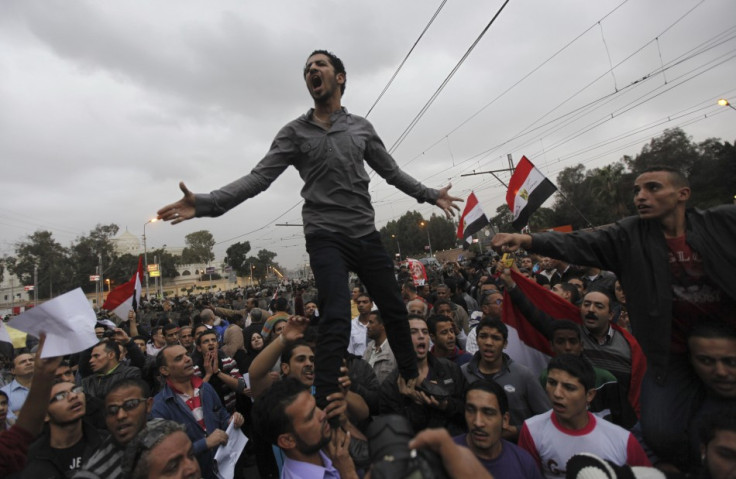Mohammed Morsi verdict: Why did Egypt jail its first democratically elected president?

Just a year after Muslim Brotherhood president Mohammed Morsi was chosen in Egypt's first democratic election, thousands of protesters took to the streets across Egypt calling for his resignation.
In the capital, Cairo, streets were flooded with protesters shouting "leave" and "the people want the fall of the regime" – chants that were popularised during the 2011 revolution and used to oust former dictator Hosni Mubarak, were now being used against the man who replaced him. The crowds were rallied by the former chief of the UN nuclear watchdog, Mohamed ElBaradei, and leftist presidential candidate Hamdeen Sabahi.
But Morsi was not unpopular with all Egyptians, and the hundreds of thousands who voted for the Muslim Brotherhood in the 2012 elections and did not oppose the party's passing of controversial Islamic laws in Egypt were also represented on the streets. Thousands of Morsi's supporters staged rallies in the Cairo suburb of Nasr City and elsewhere in Cairo.
This polarisation of opinion in Egypt was always going to result in violence. On 5 and 6 December 2012, this came to a head in clashes between Morsi's supporters and opponents near Qasr Al-Ittihadiah – the Presidential Palace. In two days of violence, at least 11 people died and more than 600 were wounded.
Morsi charges
Morsi has been charged with a number of offences, including terrorism, that are due to be heard on 16 May but the most publicised related to the police clearing of the December protest outside the palace, when three men – Husseini Abu Dhabi, Muhammed Sunosi and Mahmoud Ibrahim – were killed.
Morsi used his power and influence to instigate his supporters to attack protesters
Prosecutors alleged Morsi ordered the action on the anti-government protest and, therefore, the deaths of the three men – something prominent human rights organisations in Cairo agree with.
Mohammed Zaree, director of the Cairo Institute for Human Right Studies (CIHRS), published a wide-ranging report into the incident in January. He said Morsi and his fellow Muslim Brotherhood politicians directly urged their supporters to attack protesters.
"The former Egyptian president, alongside his deputy and other prominent members of the Muslim Brotherhood, used their power and influence to instigate their supporters to attack protesters," he said.
But Zaree does not believe a number of other charges against Morsi are justified, and pointed to a politicisation of the Egyptian courts in recent years. This has seen dozens of death sentences against Muslim Brotherhood activists and protesters, which has come as new Egyptian president Abdel Fattah al-Sisi cracks down on Islamists in the country.
Morsi and Muslim Brotherhood members jailed
Alongside Morsi, 12 members of the Muslim Brotherhood were jailed for 20 years. It comes a little over a week after Muslim Brotherhood chief Mohammed Badie and 13 others were sentenced to death for conspiring to overthrow the state. Hundreds of Muslim Brotherhood members have been received the same sentence since Sisi overthrew the government in a 2013 coup but only one has yet been carried out.
The judges choose to focus only on three of them and ignore the rest. Why? Because the three men were anti-Muslim Brotherhood while the rest were Brotherhood members
It is a point raised by others in Egypt, who feel Sisi is settling scores with his political rivals and using the courts to crack down on free speech and political freedom. In March, Human Rights Watch director Sarah Leah Whitson told IBTimes UK Egypt's situation under Sisi was worse than it was under Mubarak.
Equally, critics note that while Morsi has been jailed for 20 years, Mubarak was recently freed from prison on similar charges.
Speaking to IBTimes UK, Sherif Mohy, coordinator and researcher on counter terrorism and human rights at the Egyptian Initiative for Personal Rights, called into question the entire Morsi trial, pointing out the presidential palace protests actually resulted in 10 deaths.
"The judges choose to focus only on three of them and ignore the rest. Why? Because the three men were anti-Muslim Brotherhood while the rest were Brotherhood members... so it is politicised. It's a real shame," he said.
Morsi still faces charges of espionage and conspiracy to commit terrorist attacks, over allegations that helped to fund Palestinian resistance group Hamas and Lebanese militia Hezbollah, as well as allegations that he and dozens of other prisoners murdered a guard during their 2011 jail break from prison during the revolution.
But observers do not expect any of the trials to lead to the death penalty. Even if the government would want to see the former leader put to death, it would likely inflame tensions in a country where over 50% of Egyptians are Muslim Brotherhood members.
© Copyright IBTimes 2024. All rights reserved.





